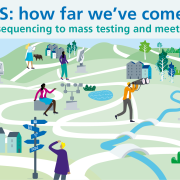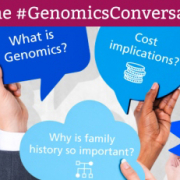Genomics: transforming diabetes patients’ care
It’s Diabetes Week, so a great time to learn how advances in genomics are improving the lives of patients with rare forms of diabetes
Many people are already aware of the two main types of diabetes, type 1 and type 2. Genomics may play a part in a person’s susceptibility to type 1 and type 2 diabetes, but it is not currently thought to be a major contributor.
That is not the case for all patients with diabetes. There are other, rarer types of diabetes, including maturity-onset diabetes of the young (MODY) and neonatal diabetes.
MODY affects 1%-2% of people with diabetes, although about 80% of those patients are either undiagnosed or misdiagnosed as having type 1 or type 2 diabetes. MODY is known as monogenic diabetes, as the condition is caused by a change in one gene. To date, six different genes have been identified, accounting for 87% cases of MODY in the UK.
Crucially, the treatments for MODY and neonatal diabetes can be different to type 1 and type 2 diabetes. They can often be treated by following a specific diet or with tablets, but depending on the genetic cause this may affect the doses required.
Recognising rare diabetes
Genetic testing is an important part of confirming the diagnosis of MODY and neonatal diabetes.
Key features of MODY are:
- diabetes that develops before the age of 25; and
- runs in families from one generation to the next (autosomal dominant inheritance).
Key features of neonatal diabetes are:
- a diagnosis of diabetes under the age of 6 months; this is different to type 1, as type 1 does not affect anyone under 6 months; and
- 20% of people with neonatal diabetes also have some developmental delay and epilepsy.
Learn about genomics and diabetes
The University of Exeter undertakes world-leading research into the genetics of diabetes, and its findings have led to changes in how patients are diagnosed and treated. In addition, the team has developed the genetic diabetes nurse project, which trains diabetes nurses across the UK in monogenic diabetes, to raise awareness and increase diagnoses.
Beginning Monday 11th June, the Exeter team is running a free online course on the FutureLearn platform for three weeks. Genomic Medicine: Transforming Patient Care in Diabetes looks at how developments in genomics is translating to clinical applications that can improve care. The course uses patient experiences to discuss the impact and value of a genetic diagnosis for diabetes for patients, their families and the clinicians responsible for their care.
Enrolment is free and the course is open to all including healthcare professionals, science undergraduates and non-specialists who want to learn more about genomic medicine. For more information, please visit the FutureLearn website. To find out more about Diabetes Week, visit Diabetes UK.









